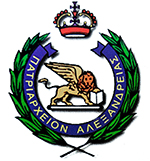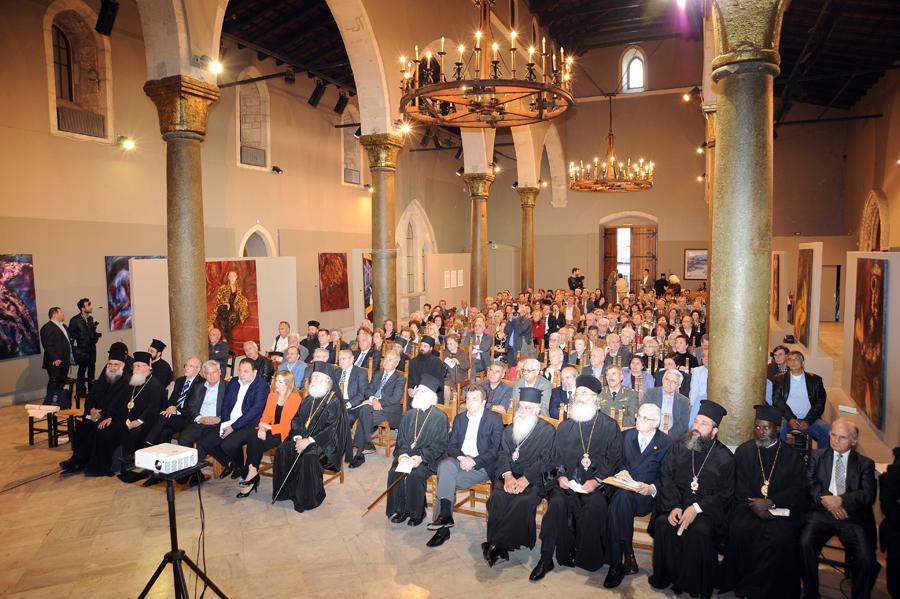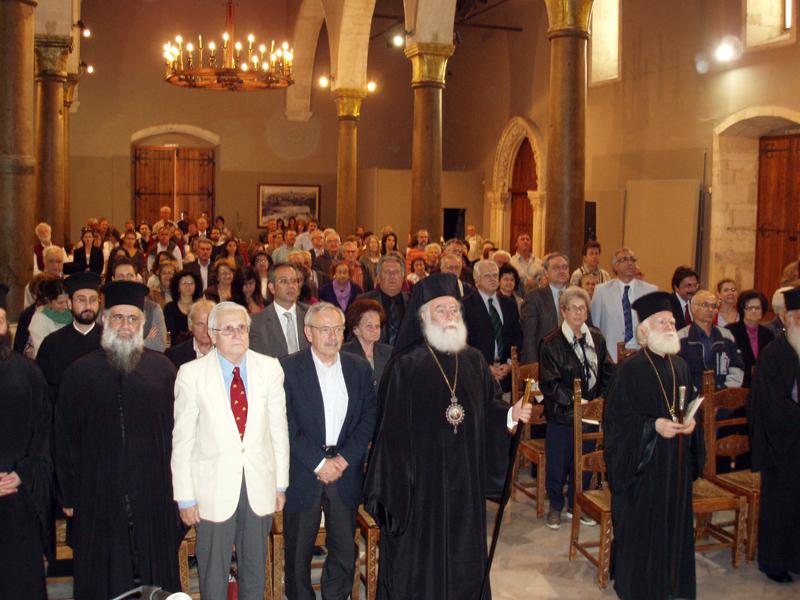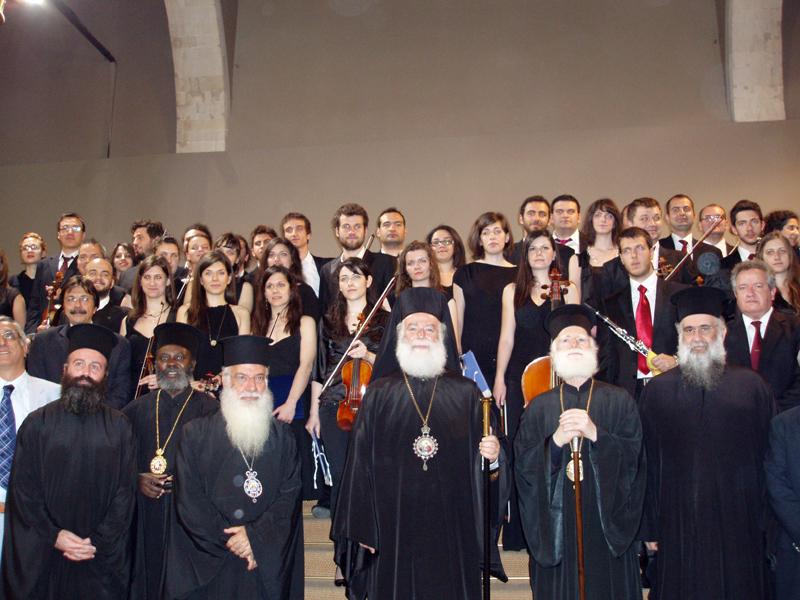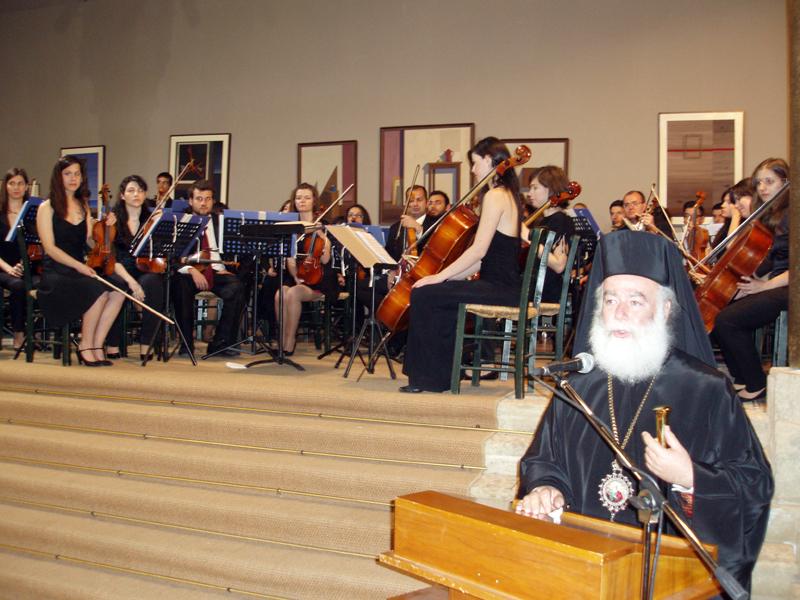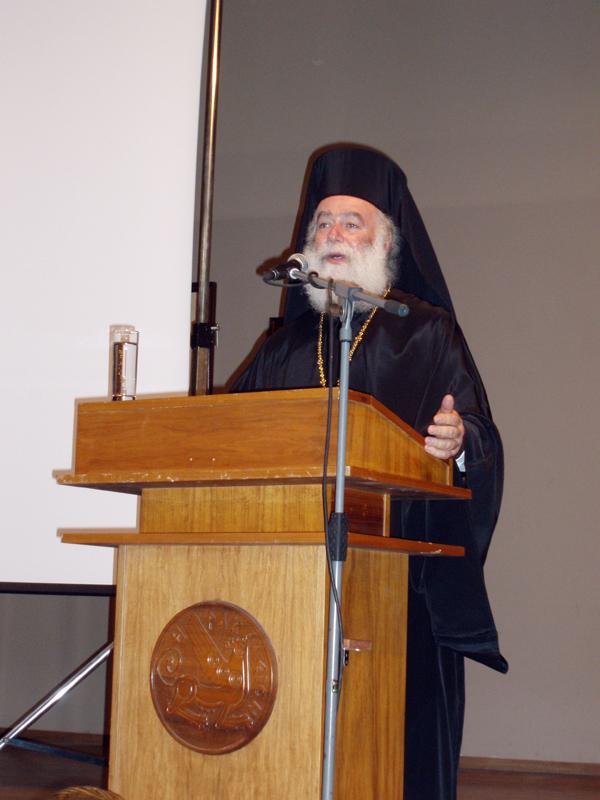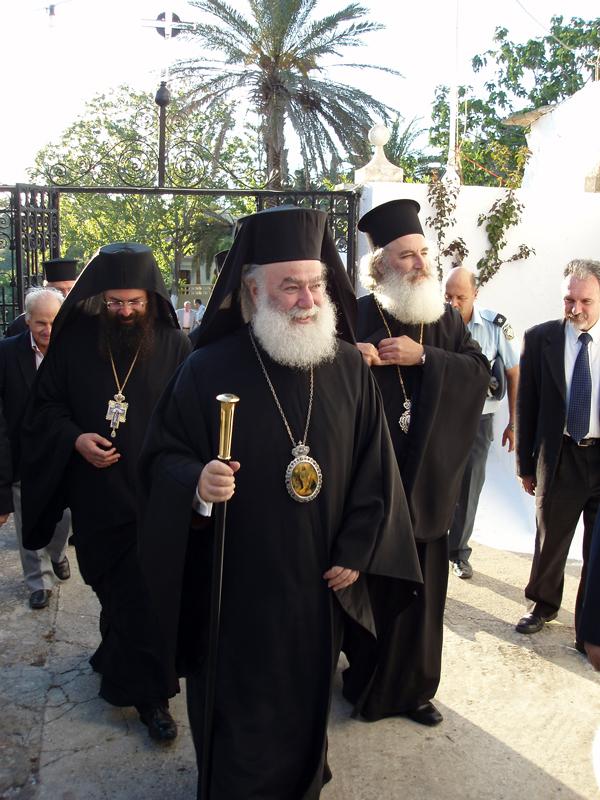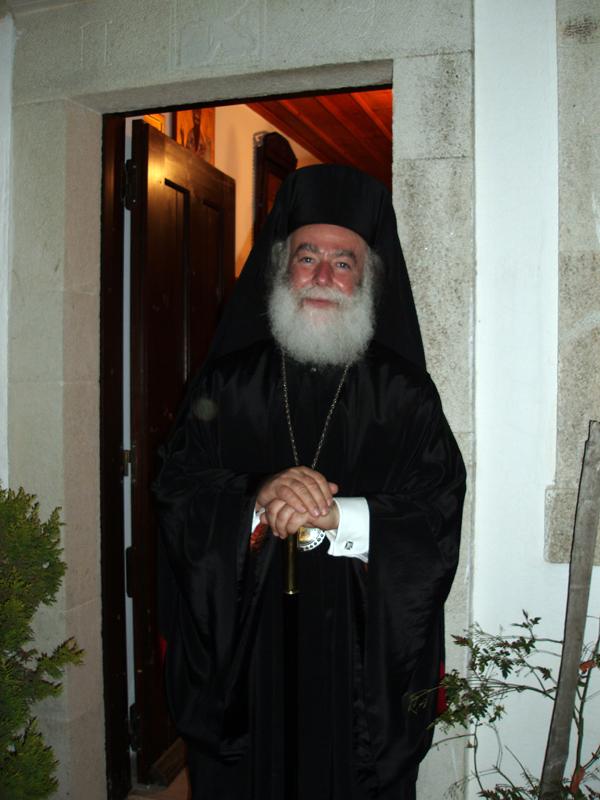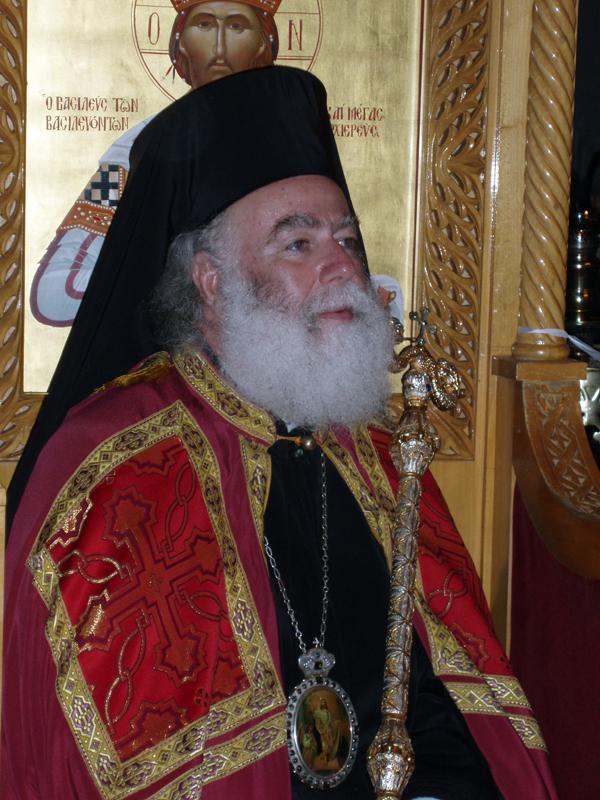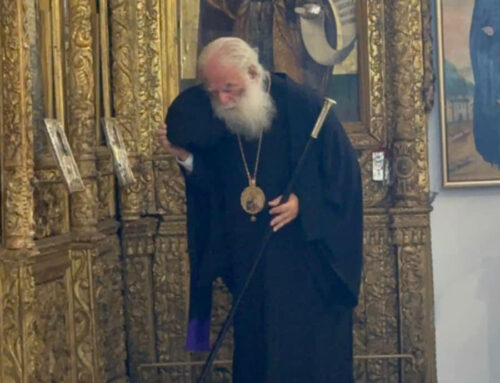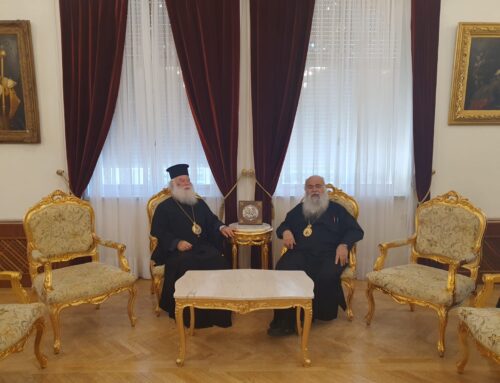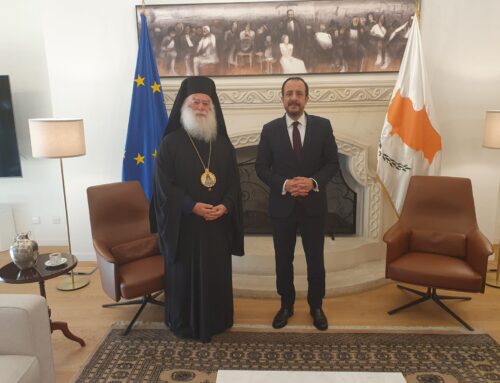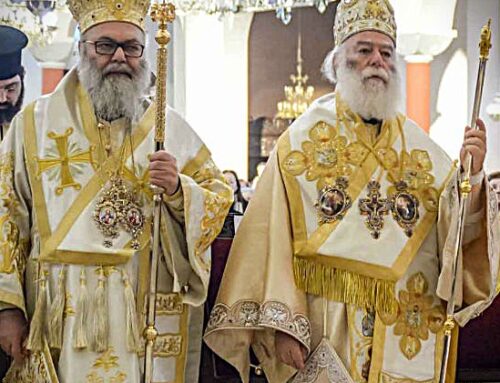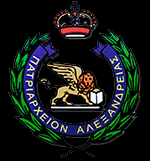Two days of functions dedicated to the Patriarchate of Alexandria and All Africa and to the Patriarchal Library of Alexandria were organised on the 13th and 14th May 2011 in Heraklion in Crete by the Vikeleios Educational Institute under the auspices of the Holy Archdiocese of Crete and the Municipality of Heraklion.
The functions were opened on 13th May in the basilica of St Mark with a one-day meeting on the subject of the role played by both the Second Throne Church of Orthodoxy and its ancient Library for Orthodoxy and Hellenism. His Beatitude was addressed by the Mayor of Heraklion Mr. I Kourakis, who in welcoming the Alexandrian Primate to his birth place of Heraklion, saw in him the fighter Primate who, in his see of the historic cradle of Hellenism, Alexandria, fights for Orthodoxy in Africa.
In his reply, His Beatitude thanked for the honour of the presence of His Eminence Irenaios, Archbishop of Crete who was surrounded by Hierarchs of the Church of Crete, the Honourable Deputy Minister of Education and Religion, Mrs. F. Gennimata, the Honourable Regional Governeor of Crete Mr. S. Arnaoutakis, the Honourable Mayor of Heraklion Mr. I. Kourakis, present and former parliamentarians and politicians of the country, as well as the Erudite President of the Vikeleios Educational Institute Mr. M Taroudakis, who was responsible for the organisation of the functions.
In his address His Beatitude spoke extensively about the presence of the Throne of St Mark in history and in the dynamic present-day. He made particular reference to the three Cretan Primates of the Alexandrian Throne, Sylvester, Meletios I, Pigas, and Kyrillos III, Loukarios in the improvement of the Patriarchate in the transition from the 16th to the 17th century: Specifically, he said:
“Apart from a common homeland, they had something else in common; they were brothers from one of the oldest Monasteries in Crete, the Monastry of Angarathos. Even though they knew they were to serve a poor Throne, they left their homeland and came to serve a small flock.
Continuing and developing the work of the longest-serving Alexandrian Patriarch, they left their seal on the two-thousand year course of the Throne of Alexandria, giving priority to education. Foreseeing the corrosive power of Roman propaganda, both Meletios Pigas and Kyrillos Loukaris were both vitally concerned about the spiritual edification of clergy and of their flock, and preached the word of God in the demotic language. A school was established in the Holy Monastery of St Savvas in Alexandria as well as a school for Orthodox Christians in Cairo”.
His Beatitude then continued, highlighting the contribution of another Cretan Primate, one of rare action and education, who in the 20th century was to seal the end of the course of the Alexandrian Throne from total impoverishment to total fortification – Patriarch Meletios Metaxis of Alexandria. Among other things he emphasized:
“Acting unconventionally, if one considers the upsurge of national antagonisms, he foresaw that the future of the Patriarchate was in Africa and its indigenous citizens. Therefore he gave to the Church of Alexandria the ability to spread its wings and to embrace as the Mother Church the entire African Continent, which was transformed into one singular ecclesiastical area. The message of Christianity which transcends time and place, as it was maintained and preached through history by the successors of the Apostle Mark, was, in the following years, to experience novel pathways of dissemination.”
The heritage of this illumined Patriarch is being experienced in contemporary times by the Alexandrian Throne, said His Beatitude who also focused the attention of the audience on the challenges which the Church of Alexandria is facing on the entire African continent. He mentioned that:
“As before, so now too, the path is not strewn with flowers. The path exhausts and wears down those who travel on it. In Rwanda the wounds left by the worst genocide of recent years are still open. In Sierra Leone the thousands of mutilated people comprise the tragic inheritance of the civil war for control of the mineral riches of the country. In Nigeria religious fanaticism provokes hecatombs of victims.
In Madagascar, behind the luxurious hotels, the population struggles to acquire drinking water. In Malawi, the pace of the spread of AIDS has taken on nightmarish dimensions. Throughout sub-Saharan Africa one in sixteen women loses the battle with death because of complications during pregnancy and birth.
Facing these challenges, the Missionaries, with sacrificial love, contribute whatever possible from a material point of view: wells, schools, hospitals, inoculations, medication, a glass of milk, some biscuits. They follow the prototype of St John the Merciful, Patriarch of Alexandria, who established inns for strangers, clinics open for all, maternity clinics for poor women. These days, from a spiritual point of view, they contribute everything, that is, Christ!”
He hoped:“…that with the grace of God, the next chapter of the two thousand year history of the Patriarchate of Alexandria would be illumined by all these lighthouses of faith, endurance and love, the Missionaries who, spread out throughout the African continent, illumine the path of hope; illumine the road to life in Christ, far from the obstacles of hard life.”
He ended, saying that the saying by Nikos Kazantzakis “stone, iron, steel do not endure; man endures”, could very well succinctly condense the historical journey of the Patriarchate of Alexandria and All Africa. And this because:
“The tens of Patriarchs that have served it may well be gone, as far as their physical dimension is concerned. However, their spirit, their soul, their conviction have left indelible marks on the collective memory of Orthodoxy and Hellenism. Through the centuries they preserved the Hellenic substance of the Church of St Mark, where others would have lost courage and would have forgotten language and beginnings. Their heritage urges responsibility for the present and a promise for the future.”
Presentations were also made by His Eminence Makarios, Metropolitan of Kenya on the Mission of the Patriarchate, His Eminence Andreas, Metropolitan of Arkalohorion, Kastellion and Viannou on the Hierarchal journey of Meletios Metaxakis, the Erudite Professor Mr. Efthymios Soulogiannis on the relations between Eleftherios Venizelos with the Hellenes of Egypt and the Erudite Director of the Patriarchal Library Mr. Apostolos Trifyllis on the Patriarchal Library as an ark of Hellenism and Orthodoxy in the Land of the Nile.
Following the presentations His Beatitude gave a commemorative gift to the Deputy Minister of Education and Religion, Mrs F. Gennimata and awarded the Mayor of Heraklion Mr. I Kourakis the Cross of St Mark, awarding the President of the Vikeleios Educational Institute Mr. M Taroudakis the Lion of St Mark.
On Saturday 14th May 2011, the events continued in the Basilica of ST Mark with a concert by the Symphony Orchestra of the Aristoteleian University of Thessaloniki, which participated under their own auspices, thereby honouring the Patriarchate of Alexandria and All Africa and the Patriarch who is also a graduate of the same university. In return, the Venerable Primate of the Church of Alexandria invited the orchestra to visit Alexandria to present symphonic music at the Patriarchal See and he then gave commemorative gifts to both the Erudite Professor of the Aristoteleian University of Thessaloniki Mr. E Krieszis, as well as to the Honourable Mayor of Maleviziou Mr. K Mamoulakis who hosted a lunch for all participants.
The two days of events closed with a Festive Vespers at the Holy Monastery of Angarthos. The Reverend Archimandrite Gerasimos, Hegumen of the Monastery and His Eminence Makarios of Kenya spoke about the rich historic tradition of proclaiming eminent hierarchs of Orthodoxy. His Eminence Metropolitan Makarios is an advocate of the classification into the saints of the Holy Synod of the Patriarchate of Alexandria, of Meletios I, Pigas and of Hieromartyr Kyrillos III, Loukaris. His Beatitude emotionally recalled moments from the years that he served in the Monastery and took the participants on a conducted tour to the cell where even today he spends days in meditation and prayer when he visits the place of his birth.


